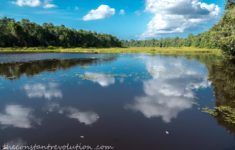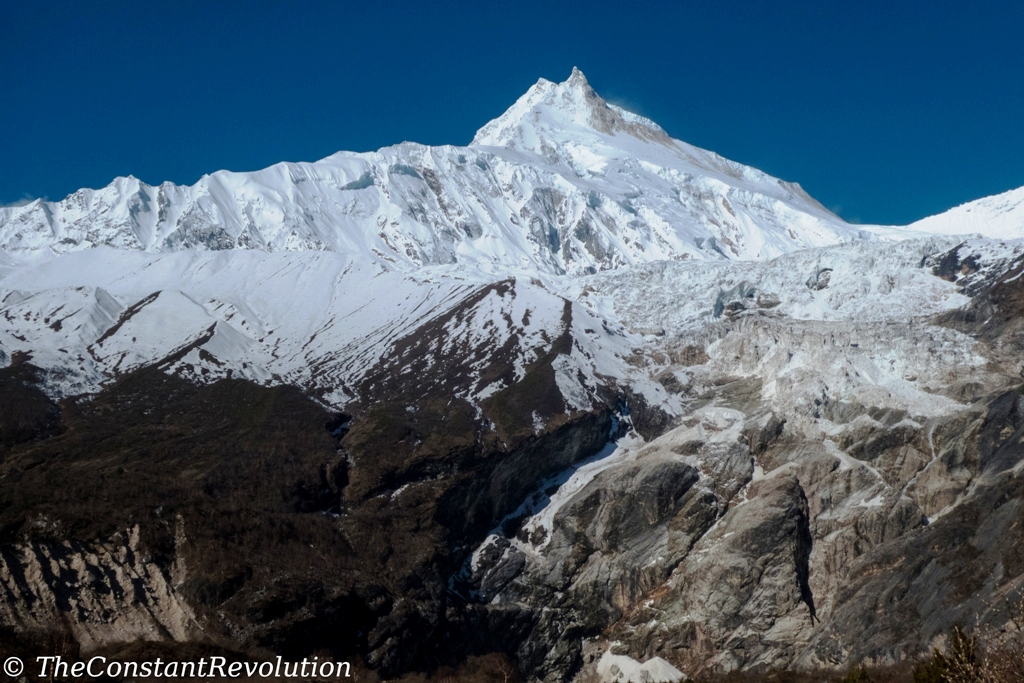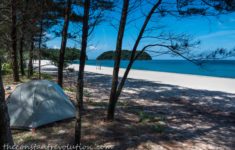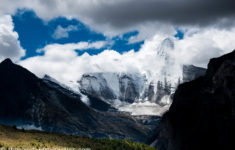In this post there’s an account of my volunteering experience in Sabah, Borneo, with the reforestation program managed by KOPEL, by far the best I had in one year of travels. One month on the Kinabatangan River, surrounded by magnificent people, inspired some deeper reflections about the connection I feel with river life.
I try to do some volunteering in every country I visit. I do so for many different reasons: staying in one place for a while allows me to understand better the local culture; depending on the projects I can do something useful; I am curious about new things, things that I haven’t done before, and anything that has to do with conservation and sustainability, including the business side of it; and in most cases it is also useful to cut down on my travel budget.

I have often found volunteering opportunities thorough well-known websites such as Workaway. But while it has proved to be useful, and some of the projects I volunteered for were related to sustainable tourism, at the end of the day they are all businesses. The deal is pretty clear: work for half a day five days a week and get free food and accommodation. A good deal, which I am glad to accept, also because some of these projects are located in very nice places, and I have genuinely observed and learned a lot working for some Workaway hosts.
However, rarely there is something more to it, a kind of wider and long-term conservation vision that goes beyond just running a business, even though a green one. So, sometimes I just search the net for opportunities, and that’s how I got in touch with KOPEL shortly after my arrival in Sabah, Borneo.
I sent them an email and they replied swiftly (I like that). They told me that volunteering for them is not for free, but the price per day they asked basically covered my accommodation at the Eco-camp in the middle of the rainforest – one of the coolest places I have been living in – food, and some fixed costs. Fair enough. Honestly, it was still much lower than my daily travelling budget in Borneo.
In my free time, I could join all the jungle and river cruises I wanted (after few days I knew the trails and could go on my own exploring the rainforest) and trust me, the place is the best for spotting the incredible Borneo’s wildlife.
I accepted, and the following day I knocked at their office’s door in Batu Puteh. It was love at first sight!

From the moment I have arrived, I felt like entering a big family. All the people were welcoming, smiling, and kind. They all remembered my name immediately – a courtesy that I did not exchange, but in my defence there were many names to learn all at once. Icing on the cake, the moment I stepped on the deck of the Eco-camp in the Pin-Supu Forest Conservation Area… I don’t know, I was just happy!
Especially because I was coming from a few weeks of travelling where I consistently felt like a fish out of his bowl on mainland Malaysia.
In a short time I understood how KOPEL works. It represents for me a perfect example on how to deal with worldwide envoronmental issues while developing a local economy. But I have explained all of this in details in a separated post. Here, I just want to share my personal experience as a volunteer.
CONSERVATION AND REFORESTATION WORK
Most of the work as a volunteer with KOPEL is aimed at their conservation and reforestation programs. It might be working at the nursery to make baby trees or helping to prepare the ground for the tree planting.

This is an activity available for tourists and it is a part of their educational programs with schools. While I was there a Chinese International School brought 80 students who planted more than 1,200 trees.

Pretty cool. In the days preceding their arrival I helped to prepare the terrain for the planting along the Kinabatangan, cutting through elephant grass with a jungle knife, which was kind of fun. Then I helped with the logistics when the students were around, and when they left those 1,250 trees needed a lot of watering – it didn’t rain much during those weeks. So, watering I did… I have also planted my own tree of course. 🙂

Sometimes, I would help two young researchers on site with their projects such as measuring trees and gathering all type of data from the rainforest. I realized how hard it is and how long it takes to do this kind of research work. In a couple of occasions I have helped cleaning the Tungog lake in front of Eco-camp from an invasive weed, which is one of the main problems, and endeavours of KOPEL.
The work is mostly under the sun and in the muddy proximity of the Kinabatangan. Tough and sweaty, but it has also a real impact on what KOPEL does. And if you, like me, have been doing a lot of office work not so long ago, then you might find out it is kind of refreshing to rediscover the dexterity of doing things (I always wanted to use the word “dexterity” in a sentence, there you go).
All in all I would work half a day, sometimes less, sometimes more, but free time was abundant. If anyone follows my Instagram account then it has realized by now that I threw myself in the jungle at every occasion trying to spot, and capture in photographs, all possible wildlife, from insects to mammals. More often than not I also succeeded 😉

HERO OF THE CAMP, HERO IN LFE
Nope, not me. Hang on, I’ll get to it in a minute. Hanging out with KOPEL people was fun, all of them with no exception had only kindness to offer me. The people at the office, at the restaurant (yummy food by the way! And soooooo much!!!), those taking care of camp and of course the amazing jungle guides. Without them I would have seen one-third of what I could see in the jungle, but I have improved my wildlife spotting skills as well 🙂 I say it again, I felt like being part of a family, and that is not a feeling that comes around here very often. I don’t know if that’s how they feel among themselves in KOPEL, I hope they do.
Yet, I have to make a special mention for my friend Norsalleh as I got closer to him in particular, and because his story is truly inspiring!
The best jungle guide ever, he can see things we humans cannot imagine (cit. kinda) in the forest, this selfie-loving man – you can see him in a couple of photos on this post – is the coordinator of volunteers, of the tree planting program, and he can build pretty much everything with a jungle knife and recycled material from the forest. He is also a master of Silat, a Malaysian martial art very similar to Tai-Chi, although more dynamic. I saw an impressive demonstration done by him during a cultural performance. Most importantly, he is a keen wildlife photographer.

Norsalleh is deaf and mute, but he can make himself understood so well. He kind of came up with his own intuitive way of communicating with gestures. I have worked alongside him most of the time, and when he understood I also like photography, and I don’t get easily tired, he would ask me to tag along in his pilgrimages in the jungle. I couldn’t ask for a better treatment, and never there has been a problem of communication.
It sounds banal perhaps, but with Norsalleh I confirmed to myself something I have always suspected: that words are not so important to understand each other.
They might have some value to present ideas and concepts in society, but they are definitely overrated when it comes to feelings of any kind. Do we really need to hear it out loud to understand that we are loved? Do we need to tell a friend out loud that we like hanging out with him or her? I don’t think so, we just do it.
Norsalleh is the hero of the camp, committed to KOPEL’s conservation work for 20 years and respected by all his colleagues, not least for his skills. I have learned so much just by observing his ways around camp and in the rainforest.
He is a hero in life, an example of how you can find purpose despite a disability that most of the people would consider too cumbersome to do what he does. It has been a privilege to get to know him, and follow him in the jungle at every occasion, cameras firmly grasped in our hands, looking for some nice images of (wild)life to capture.
LIFE ON THE RIVER
So, volunteering with KOPEL has been a great experience through and through. I would do it again, and perhaps I will. But beside the work and the people, I must reflect upon the deeper meaning that living on the river has for me.

Every time I was on the Kinabatangan my heart was calm. It was like being enveloped by a thin invisible barrier of serenity. The engines of the boat that needed to be started manually, the fishermen with their nets, the smell of the mud, the mosquito, the chirping of the birds and the occasional splash of the fish jumping. The isolation and protection the river provides from everything and everyone. It is all so familiar.
The seemingly unchanging flow of the waters sculptures the voluptuous shapes of the river banks, and with them of the entire landscape. It’s slow work, imperceptible, day after day, instant after instant. Yet, to us the river looks always the same. Instead, the water is never the same it was a minute before, nor is the land touched by the river, nor is the air touched by the land.
Aren’t we all like a river? We keep flowing, we keep changing, we are never the same person, one moment after the other. Sometimes we are impetuous and outward-looking, and our waters are fast and dangerous, and bold; some other times we are sensible and inward-looking, and our waters are calm and cautious. Yet, they keep flowing with the same tenacious and oblivious persistence.
We change ourselves and we change our surroundings, and the others, in relations of mutual causality that we do not perceive, often lullabied by the illusion that our river has stopped, that change isn’t implacable, inevitable, terrible in its most intimate nature. Perhaps it is better like that, it is easier, and comforting. What are we to learn by observing movement?
I often think of that part of the book in which Siddharta lives on the river and ferries people from one side to the other. For years he lives in the same spot, he eats the same food, he speaks the same words, he does the same, menial work. For years he does not move. However, he never stops observing the flow of the river, until when the river speaks to him.
I felt such a connection with this river. But I know it wasn’t the place itself. It’s a connection in my mind and in my heart with all the rivers of the world.
I was also born on a river in the north of Italy. My father was a passionate riverman. A riverman, yes, as it wasn’t only about fishing with him. He just loved to be around the river, to spend time on the boat, cleaning up the banks to make small beaches where to spend the weekends with a fishing net. He used to stare in silence at the water flowing, or perhaps at the weeping willows caressing the water in a far inlet, while waiting to pull up the fishing net.
He enjoyed the river, and I did too. I still do. He enjoyed the silence, the isolation and the protection, and the sounds of nature the river has to offer. I am not sure what he was thinking. I don’t think he was much focusing on the meanings of life the river might be hiding. He just liked it there, he was part of it, he was at peace, and perhaps that is more than anyone can hope for.
I would have loved to tell him that I enjoyed our time on the river, that it was meaningful, that the river changed us there, that he changed me and I changed him, even without words, and that that is also love, and whoever I have become, those moments are forever impressed in my memory. I would have loved to tell him so.







